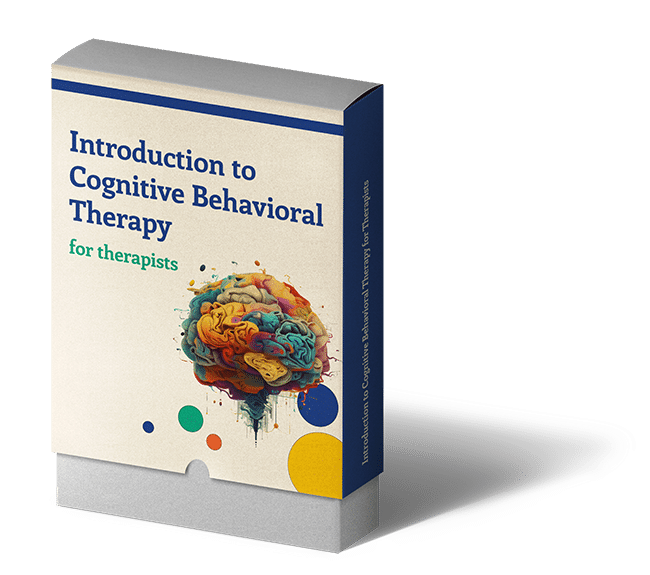Learn about Cognitive Behavioral Therapy from your inbox

Many therapists begin their careers with a foundation in one modality, be it psychodynamic, humanistic, or any of the myriad other approaches available. As they progress in their careers, they often encounter clients or situations that require a different set of tools. This is where the importance of learning multiple modalities comes into play.
CBT, with its structured, goal-oriented approach, offers therapists a concrete framework to help clients identify and challenge negative thought patterns and behaviors. For therapists who started in other modalities, understanding CBT can provide a fresh perspective and an additional set of techniques to integrate into their practice.
Table of Contents
- What’s in the course?
- Get the free CBT course
- Why an email course?
- Overview of Cognitive Behavioral Therapy
- Understanding Cognitive Therapy Homework
- Examples of CBT homework
- The Importance of CBT Homework
- Encouraging Patient Compliance
- Reflective: The Therapist-Facilitated App
What’s in the course?
This course is specially curated for professionals who aspire to sharpen their skills in cognitive behavioral therapy (CBT). This course offers you the opportunity to enhance your practice and deliver better mental health outcomes for your clients.
The course explores cognitive behavioral therapy in an accessible and practical format, starting with the basics of CBT before diving into its diverse applications. Each email in the series features succinct yet comprehensive lessons, hands-on exercises, and quizzes to offer you a dynamic and engaging learning experience. Get ready to embark on this enlightening journey that promises to equip you with the tools you need to practice effective CBT.
Why an email course?
While workshops, seminars, and traditional courses are invaluable, they can also be time-consuming, expensive, and geographically limiting. An email course offers a unique solution to these challenges:
- Flexibility: Therapists can learn at their own pace, fitting the course into their busy schedules.
- Accessibility: No matter where they are in the world, therapists can access the course. All that’s needed is an internet connection.
- Did you say free? By offering the course for free, we remove financial barriers, making quality education accessible to all.
- Consistent Learning: With regular email lessons, therapists receive consistent reminders to engage with the material, promoting steady learning over time.
Overview of Cognitive Behavioral Therapy
Cognitive Behavioral Therapy (CBT) is a well-established and evidence-based approach to psychotherapy founded by Aaron T. Beck, that focuses on identifying and challenging negative thought patterns and behaviors. One of the unique features of CBT, distinguishing it from other therapeutic modalities, is the use of homework assignments. For therapists new to the CBT approach or those looking to refine their understanding, let’s explore CBT homework a bit, and the critical role of patient compliance.
Understanding Cognitive Therapy Homework
CBT homework, often referred to as “between-session assignments”, “practice assignments,” or as one therapist said her tells his clients, “Side Quests” consists of tasks that patients are asked to complete outside of their therapy sessions. These tasks are designed to reinforce the skills and strategies learned during therapy, allowing patients to apply them in real-world situations, when faced with situational triggers.
Examples of CBT homework might include:
- Thought Records: Patients track and challenge negative thoughts as they arise in daily life.
- Behavioral Experiments: Testing out new behaviors to challenge previously held beliefs.
- Relaxation Techniques: Practicing deep breathing or progressive muscle relaxation to manage anxiety.
- Exposure Tasks: Gradually confronting feared situations to reduce avoidance behaviors.
The Importance of CBT Homework
- Skill Generalization: Homework assignments help bridge the gap between the therapy room and the outside world. By practicing skills in real-life contexts, patients can generalize what they’ve learned to various situations, making the therapeutic gains more robust and long-lasting.
- Active Participation: CBT is a collaborative approach. Homework encourages patients to take an active role in their healing process, fostering a sense of ownership and empowerment.
- Feedback Opportunity: Homework provides therapists with valuable feedback. If a patient struggles with an assignment, it can highlight areas that need further exploration or clarification in subsequent sessions.
- Accelerates Progress: Regular practice can accelerate the therapeutic process. Just as with learning a musical instrument or a new language, consistent practice leads to quicker mastery.
- Builds Resilience: As patients face challenges and apply CBT techniques, they often experience successes, building confidence in their ability to handle future challenges.
Encouraging Patient Compliance
While the benefits of CBT homework are clear, ensuring patient compliance can sometimes be a challenge. Here are some strategies to enhance adherence:
- Collaborative Setting: Involve patients in the process of deciding on homework tasks. This collaboration can increase their buy-in and commitment.
- Clarify Purpose: Ensure that patients understand the purpose and relevance of each assignment and the connection between the task and their therapeutic goals.
- Manageable Tasks: Assignments should be challenging but achievable. Breaking tasks into smaller steps can prevent patients from feeling overwhelmed.
- Regular Review: Begin each session by discussing the homework. Celebrate successes, and approach challenges with curiosity rather than judgment.
- Address Barriers: If a patient consistently struggles with assignments, explore the underlying reasons. There might be logistical barriers, misconceptions, or emotional resistances at play.
- Normalize Struggles: Remind patients that it’s natural to face challenges when trying something new. Encourage a growth mindset, emphasizing the value of effort and persistence.
Reflective: The Therapist-Facilitated App for Cognitive Therapy to boost CBT compliance
Reflective is a therapist-facilitated app offers personalized reminders and assignments, ensuring that patients stay compliant with their treatment plan. With the therapist’s oversight and the convenience of a digital platform, it strikes the perfect balance.
With Reflective, a therapist can add the precise CBT homework a patient needs, and it can be customized and set on the schedule that works best for them. Additionally, the built-in accountability and structured connection with their therapist increases treatment compliance and clinical insight. Patients have the convenience and ease of an app in their pocket, with the comforting knowledge their therapist is on the other side of their assignment submissions.


